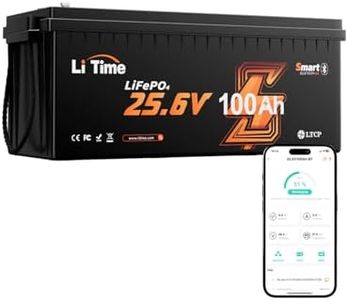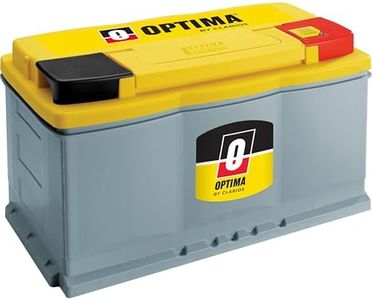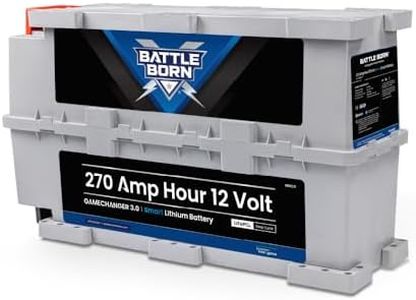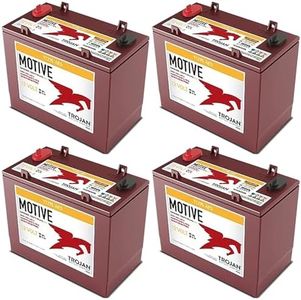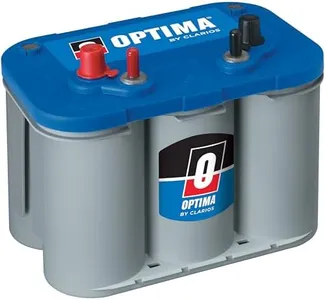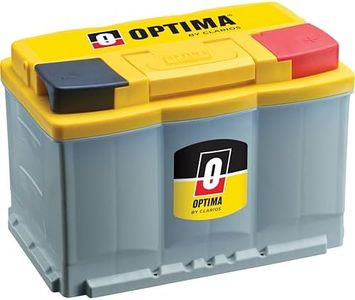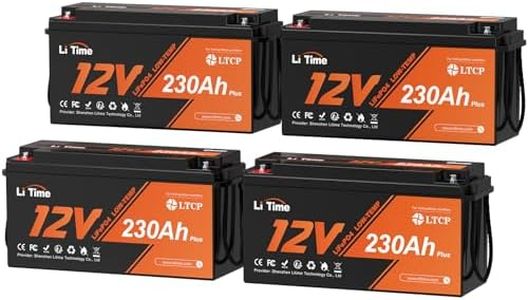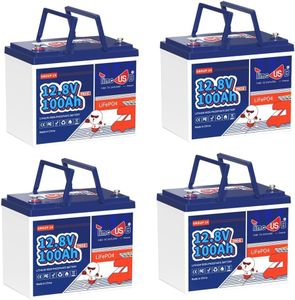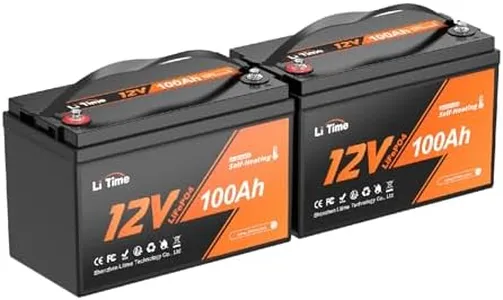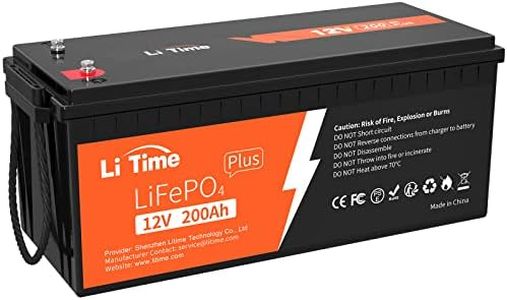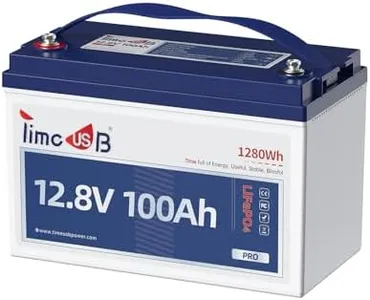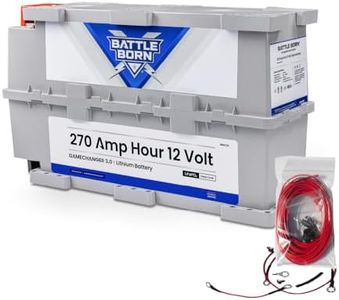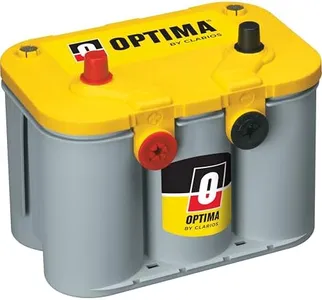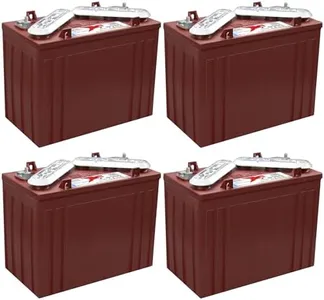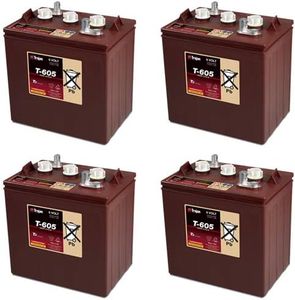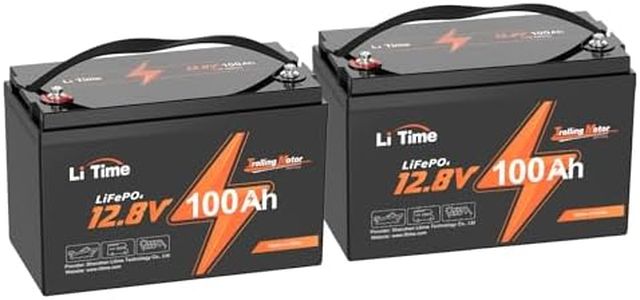10 Best Deep Cycle Batteries 2026 in the United States
Our technology thoroughly searches through the online shopping world, reviewing hundreds of sites. We then process and analyze this information, updating in real-time to bring you the latest top-rated products. This way, you always get the best and most current options available.

Our Top Picks
Winner
OPTIMA Batteries High Performance DH7 YellowTop Dual Purpose Sealed AGM Car, Truck and SUV Battery, 880 CCA, Maintenance Free, Versitile Mounting, BCI Group Size 94R
Most important from
181 reviews
The OPTIMA YellowTop DH7 is a versatile 12-volt deep-cycle battery designed for cars, trucks, and SUVs with high electrical demands. It offers a solid capacity of 80 amp-hours, which is decent for extended use, and 880 cold cranking amps, meaning it can reliably start your vehicle even in cold weather. The battery uses AGM (Absorbent Glass Mat) technology, which is maintenance-free and sealed, so you don’t have to worry about refilling fluids or leaks. One standout feature is its resistance to vibration—claimed to be 15 times better than standard flooded batteries—making it a durable choice if you drive on rough roads or need a tough battery.
The battery is also compact and relatively heavy at just under 50 pounds, reflecting its sturdy build. It has a good reserve capacity of 155 minutes, allowing it to provide consistent power when the engine is off. This battery charges faster and lasts up to three times longer than regular flooded batteries, which benefits those who need reliability over the long term.
This battery is well-suited for users who want a maintenance-free, durable option that performs well for starting and moderate deep-cycle applications, especially in vehicles with high power needs.
Most important from
181 reviews
270Ah 12V GC3 Smart Lithium-Ion (LiFePO4) RV, Marine, Solar, & Off Grid Battery - Bluetooth Connectivity - Battle Born Batteries
Most important from
2 reviews
The Battle Born 270Ah 12V GC3 battery is a lithium iron phosphate (LiFePO4) deep-cycle battery designed for RVs, marine use, solar setups, and off-grid power systems. With a substantial 270Ah capacity and a standard 12V output, it provides reliable energy storage for extended use. Lithium-ion chemistry means it is lighter and more efficient than traditional lead-acid batteries, weighing 81 pounds, which is relatively manageable given its high capacity.
The battery includes smart features like Dragonfly IntelLigence technology with Bluetooth connectivity, allowing you to monitor battery health and status wirelessly—a handy feature for keeping track of performance remotely. Its physical size is moderate (about 23" x 7" x 13"), so it can fit in many standard battery compartments, though you should check space availability. LiFePO4 batteries typically offer excellent longevity and can handle deeper discharges compared to lead-acid types, which is ideal for deep-cycle use.
While the price point is relatively high, which is common for advanced lithium batteries, this battery suits anyone needing a durable, smart, and efficient energy storage solution, especially for mobile or renewable energy setups. Those on a tight budget or needing extensive user data might want to consider alternatives.
Most important from
2 reviews
4 Pack Trojan T1275-AES 12V Superior Deep Cycling VRLA AGM Batteries
Most important from
1 reviews
The Trojan T1275-AES 12V AGM deep-cycle batteries come as a set of four, each with a solid capacity of 124 Ah, making them a strong choice for applications like golf carts, utility vehicles, and floor cleaning machines. These batteries stand out with up to three times the cycle life compared to standard AGM batteries, meaning they last longer through repeated charging and discharging. The sealed AGM design makes them maintenance-free and safe, with good performance even in harsh conditions and partial state of charge scenarios.
Their rugged construction and ability to handle deep discharges make them reliable for demanding, continuous use. However, these batteries are quite heavy at 85 pounds each, which may make installation or handling a bit challenging. Also, while they offer a good warranty and durability, some users might find them on the pricier side compared to other options.
If you need a dependable, low-maintenance deep-cycle battery with a balance of long life and strong performance, especially for equipment that runs regularly, the Trojan T1275-AES is a solid pick. Just be prepared for the weight and ensure your device can accommodate their size.
Most important from
1 reviews
Buying Guide for the Best Deep Cycle Batteries
When choosing a deep-cycle battery, it's important to understand that these batteries are designed to provide a steady amount of power over a long period of time, making them ideal for applications such as solar energy systems, RVs, and marine use. The right battery for you will depend on your specific needs and how you plan to use it. Here are some key specifications to consider and how to navigate them to find the best fit for your requirements.FAQ
Most Popular Categories Right Now
